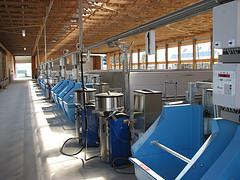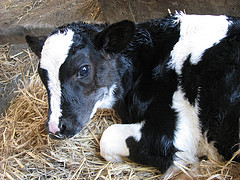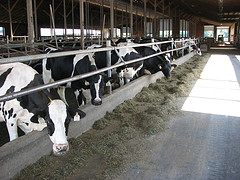This story originally appeared in the Spring 2018 issue of the BC Holstein News.

Mean (± SEM) percentage of time groups of lactating dairy cows (n = 8 groups) spent outside and inside the free-stall barn during the night (20:00 – ~ 8:00) when provided a free choice between the free-stall barn and pasture and between the free-stall barn and a sand pack (adapted from Smid et al. 2018; Journal of Dairy Science 101:1448-1455).
Societal concerns regarding the quality of life of dairy cows include the issue of outdoor access. A series of studies done at UBC has shown that cows will spend most of the day inside and most of the night on pasture, when given a free choice. Research has also shown that pasture access can provide certain health benefits, including improved udder, foot and leg health. However, providing pasture access is not always feasible for dairy farmers. Farmers can face a range of practical constraints, including the lack of available pasture, particularly as farm sizes increase. A possible alternative to pasture is to provide cows access to a deep-bedded outdoor area where cows can move and lie freely. This alternative requires less space than pasture and may be easier to implement on some farms. The main objective of my PhD is to investigate the potential of these outdoor packs to make outdoor access for dairy cows more feasible on farms.
The aim of my most recent experiment was to determine the preference of dairy cows to access pasture versus an outdoor sand pack during the night. When offered access to both outdoor options at the same time, cows spent 90% of the night on pasture and only 1% of their available time on the sand pack (with the remaining time spent inside the free-stall barn). Despite having free access to TMR inside the barn, cows may have been highly motivated to graze. Another possible explanation for our results is the larger space provided on pasture compared to the sand-bedded pack. We are currently investigating whether providing more space on the outdoor pack increases usage.
Our second aim was to determine if cows that were only allowed access to the outdoor sand-bedded pack and the free-stall would still prefer to go outdoors during the night. Our results indicate that when provided access to the sandbedded pack as the only outdoor option, cows chose to spend about half the night outside (see photo). In new research, we are assessing preference for an outdoor pack in more adverse conditions such as during cold, wet winters.
Anne-Marieke Smid obtained her Masters in Animal Science at Wageningen University, The Netherlands and is currently a PhD student in the Animal Welfare Program at the University of British Columbia.




